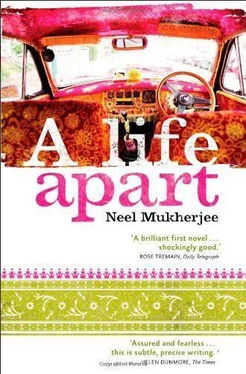Meanwhile, the boys instinctively understood that this bit of friction between their parents was going to take its toll: as soon as their father left the house, she was going to take it out on her sons. They waited in terror and not knowing what she was going to peg her fury on made it worse. It could be a spelling mistake in one of the sets of homework from school; not knowing ‘by heart’ the last Geography chapter, including every single punctuation mark; or a slip-up in the perfect arrangement of books in the school satchel, the biggest one at the bottom, the smallest one on top and everything in between in descending order of size; an unsharpened pencil in the pencil-box — it could be anything. She could even manufacture something to suit her purpose. They could only wait with churning stomachs and small, dimmed faces, but even during their mother’s worst excesses, they prayed and hoped their father wouldn’t intervene.
Ritwik was the convergent point of all these coiled energies in her. Her excuse was simple: he was the older of the two; he had to be flawless so that Aritra could follow in the track made by him. That was what Ritwik became, a bit of substantiating evidence around which the flux of daily life was organized. He was the furrow which her cultivating zeal carved out. He was to become her creation, her prize garden, her impeccable son. He was going to be her bulwark against everything that life had ranged in battle against her. Bend him, buckle him, mould him like wax, like clay, like putty, he’s mine, my love will build him anew, I’ll show them I’ve won, the ooze of oil comes only from pressing and bruising, the life in him is going to be the shine of oil, not the dullness of uncrushed seed and I’m going to be responsible for the radiance , she thought.
The first zone in which this experiment was put to practice was Ritwik’s education. Every evening, from six to nine, was homework time: she supervised this, in between cooking dinner for the family, with the sharpness of a predatory bird.
‘What subjects do you have for school tomorrow? Take out your diary, let me look at the timetable,’ she began, her voice already poised between command and threat.
Ritwik passed the diary to her.
‘Why can’t you open it to the right page and read it out? Can’t you read?’ she shouted.
‘But. . but you asked. .’ he muttered.
She cut it short, ‘Don’t dare answer back, do you understand?’ Her voice was beginning to hurt the inside of his eyes and the juddering place behind his ribs.
She took a quick look at the timetable. ‘Moral Science, Spelling & Dictation, English Language, Bengali, Science, History & Civics, Math. .’ she read out. ‘All right, take out your Moral Science textbook. I want you to learn the questions and answers at the end of the chapter you did in school today. After that, I’m going to give you a spelling and dictation test from the new lesson in Radiant Way Reader, “The Cook and the Crane”. I’m going to the kitchen now, I’ll be back in an hour. I want both subjects thoroughly prepared by that time. Otherwise you have trouble on your plate.’ Every word, every sentence, was a fusillade of command.
She thud-thudded off, leaving the scared boy fumbling with books, having trouble focusing on the words on the page. She returned almost immediately and shouted, ‘I want you to read the lessons out aloud, so I can hear you from the kitchen. I want to be sure you’re not wasting time.’
Ritwik mounted a feeble opposition to this. ‘Why can’t I do it silently?’
She deigned to reason with this one. ‘It’s because reading out aloud fixes the work in your head better because you read it and hear it.’
‘But I think I learn better if I read things in a murmur rather than aloud.’
‘You know better than I do?’ That fireform again. He gave in.
For the next half an hour or so, the cheap waxy pages of the Moral Science textbook, with their faint whiff of rancid glue, and the catechism-type exercise at the end of each chapter, became a compact prelude to terror. Its opening chords were so loud and consuming in his ears and his blood that the words on the page were either not fixable or they were meaningless. Why must we love, honour and obey God? We must love, honour and obey God because He made us in His image and likeness, put us in this beautiful world to enjoy His goodness and generosity, blessed us with life and gave us the chance to glorify Him. He also gave us parents to love and take care of us . They were in an opaque code, he could have been reading hieroglyphics; he was so scared that willing his voice to give sound to them, one by one, could not give them any meaning. How could he ever learn all this ‘by heart’ if they never moved from mark to meaning?
He could hear miscellaneous sounds of sizzling and frying and clanking of metal pots and pans coming from the kitchen. And the occasional tremor of her tread as she moved around. Once or twice, there would be a sudden shout from her, ‘Why can’t I hear you? Why has your voice gone low?’ He’d nearly jump out of his skin and increase the volume ‘. . He endowed us with free will s o that w e can choose between good and bad . .’
Some of the answers were quite long, nearly five or six lines; he hated them. Others were short and easy and these he learnt first, leaving the involved ones till later. His attention kept wandering off — he was tempted to look at the final few chapters of his Geography and Biology books, such virgin pages, so far away in the school year. They would do those much later on, in winter, the chapters on tea-growing in Darjeeling and Assam; the north-eastern hill states and union territories; the digestive system; a chapter called ‘Coal’. And what was that one about the man being swallowed whole by a huge whale and staying alive in its belly? He couldn’t wait to read it all in one quick go. They were new lands waiting to be discovered in the vast sea of this boredom of lessons done to death. He kept sneaking looks at those untouched pages; they were almost forbidden and delicious.
Dida, limping around the flat, came by, stopped at the door and said, ‘You’ll be put through the wringer if you don’t do your work; will serve you right,’ and hobbled off. It came out of thin air; no encouragement, no motive, nothing. Did this add some sense of drama to the dead sameness of her days?
Suddenly Bidisha was in the room where Ritwik sat on the floor, amidst the untidy strew of his schoolbooks, pencils, and dirty satchel.
‘Are you ready then?’ she demanded.
Ritwik froze. ‘Nnno. . I mean yes. . but. .’ he stammered weakly.
Ritwik desperately wanted his father to come back: in his presence, she shouted and went as far as giving him a slap or two but never let herself go fully. That transformation into a column of fire had to be repressed till he was out of the house.
‘Give me the book.’ She settled down on the floor opposite him and picked out the wooden ruler. So this was going to be her weapon this evening. It had happened so many times before that Ritwik didn’t even flinch but he was scared. Fear was forever new, like spring; nothing ever robbed it of its edge and thisness. She fired quick volleys — ‘Which chapter? Which page?’ — and then began asking him the questions at the end of each chapter. He was going to have to give her the answer printed after each question verbatim.
‘Why did God make us in His image and likeness?’
‘God make. . God make. .’ he whispered, his eyes focused on the slow, irregular brandishing of the ruler gripped in her hand, and almost immediately knew he had made a mistake because she looked up at him with a dull gleam in her eyes and interrupted him.
Читать дальше












